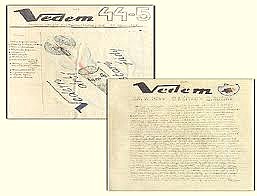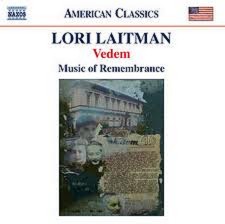
ReviewsVedem: Music of Remembrance The performers who brought the music to life at its world premiere on 15 May, 2010 in Seattle, Washington were mezzo-soprano Angela Niederloh and tenor Ross Hauck with the Northwest Boychoir conducted by Joseph Crnko accompanied by the quartet Music of Remembrance: Laura De Luca, clarinet; Mikhail Schmidt, violin, Walter Grey, cello with Artistic Director Mina Miller at the piano. In the opening song, Hear My Story Now, the tenor and boychoir give voice to the stories of those “who vanished from the world.” The opening chord plunges you into an intensely beautiful sound space with just a hint of an old Jewish melody in the violin. The mood of the song is upbeat with only a hint of stress. Memories of Prague (text Petr Ginz) is set for mezzo-soprano and offers the longing of a boy for his home in Prague “…for almost a year I have huddled in this awful hole” as he continues dreaming of his city, a fairytale in stone. Mr. Mason’s text creates the narrative that weaves the poems into a coherent story set to listenable music. Five (text Hanuš Hachenburg) speaks of the five unfinished novels in a sack that cry out for our attention. Just a Little Warmth (text Zdenek Ornest) “No wish have I to wash under the cold tap /Slowly I drown, not in shame, but filth.” Only in sleep does he find relief. The humorous Love in the Floodgates (text by survivor Josef Taussig) says “My darling, I’d love to kiss you” but how can I get my arms around you when you are in five panties, two dresses, etc. This is only a sampling of the diverse moods you find in fifteen songs and connective dialogues between boychoir and soloists. As has been pointed out, the clarinet, violin, cello and piano are the same combination of instruments used by Poulenc in his Quartet for the End of Time. They work well here also. The last twelve minutes of the CD is Fathers (2002, revised 2010) sung by Ms. Niederloh with violin, cello and piano accompaniment. The poetry is by Anne Ranasinghe and David Vogel. It is a lovely meditation on death, explored from the inner feelings of the poet. In the first poem she recalls making a photograph of her father with all of the memories of that day. The second poem speaks of a dream of loss from which she wakes to find she is alone. The third poem is by Vogel who speaks of his father’s fading away into the deep and of Vogel’s coming to terms with his own fading into rest at the end of his life. Between each poem Ms. Laitman has set a fragment of Don’t Cry until the conclusion when the entire poem of burying the chards of the broken past and letting nature do its work of covering memory is sung. The chamber setting, especially the voices of Ms. Niederloh and the cello are marvelously consoling. |
 Composer Lori Laitman (b. 1955) is known as one of America’s most prolific and acclaimed composers of vocal music. Over 200 songs, two operas and now, an oratorio,Vedem, are in her catalogue of settings of contemporary and classical poets. Among them are lost voices of poets who perished in the Holocaust. Vedem is based on the story of teenaged boys who published an underground magazine at the Terezin concentration camp. Ms. Laitman has said “I was immediately captivated by the courage of the boys of Terezin as well as the depth and beauty of their art.” The libretto, by David Mason, captured not only the tragic aspect of the boys’ lives but also their little worries and spirited responses to adversity, their yearnings and their humor. Ms. Laitman’s settings capture the feeling of their worries, frustrations and joys at being alive and creative. There is always the naturalness of ordinary speech in her settings and it is especially apparent in the six poems by the boys themselves incorporated into the libretto
Composer Lori Laitman (b. 1955) is known as one of America’s most prolific and acclaimed composers of vocal music. Over 200 songs, two operas and now, an oratorio,Vedem, are in her catalogue of settings of contemporary and classical poets. Among them are lost voices of poets who perished in the Holocaust. Vedem is based on the story of teenaged boys who published an underground magazine at the Terezin concentration camp. Ms. Laitman has said “I was immediately captivated by the courage of the boys of Terezin as well as the depth and beauty of their art.” The libretto, by David Mason, captured not only the tragic aspect of the boys’ lives but also their little worries and spirited responses to adversity, their yearnings and their humor. Ms. Laitman’s settings capture the feeling of their worries, frustrations and joys at being alive and creative. There is always the naturalness of ordinary speech in her settings and it is especially apparent in the six poems by the boys themselves incorporated into the libretto Between 1942-44 about 115 boys, aged 13-15 were housed and educated together. The Nazis' cynical goal was to use this as a showplace for Red Cross visitors to show how they were treating the Jews in the camps. Only a single copy of the magazine was printed each week and then read at night behind blackout shades. The editor, Petr Ginz, a youth who wanted to be a writer when he grew up, like many of the boys there, died in Auschwitz. Only about fifteen of the boys survived and one, Zdenek Taussig, returned after the camp was liberated and retrieved the buried copies of Vedem. (The title is Czech for vanguard.) In 1994 a collection of writings by the boys of Terezin concentration camp was published as We Are Children Just the Same.
Between 1942-44 about 115 boys, aged 13-15 were housed and educated together. The Nazis' cynical goal was to use this as a showplace for Red Cross visitors to show how they were treating the Jews in the camps. Only a single copy of the magazine was printed each week and then read at night behind blackout shades. The editor, Petr Ginz, a youth who wanted to be a writer when he grew up, like many of the boys there, died in Auschwitz. Only about fifteen of the boys survived and one, Zdenek Taussig, returned after the camp was liberated and retrieved the buried copies of Vedem. (The title is Czech for vanguard.) In 1994 a collection of writings by the boys of Terezin concentration camp was published as We Are Children Just the Same.  The quartet is especially important in creating the music of the model ghetto - an opera performance for the visiting Red Cross. The lie of the happy Jews is only a pause before the transports once again resume carrying victims to Auschwitz. The play is over, the props must be removed and the listener is fully aware that this is all just a sad memory of a time when the best of human creativity and the worst of depersonalized humanity and mechanized hatred came face-to-face. Ms. Laitman’s music is a powerful retelling of a small part of this huge, human story. They ask only that we remember them.
The quartet is especially important in creating the music of the model ghetto - an opera performance for the visiting Red Cross. The lie of the happy Jews is only a pause before the transports once again resume carrying victims to Auschwitz. The play is over, the props must be removed and the listener is fully aware that this is all just a sad memory of a time when the best of human creativity and the worst of depersonalized humanity and mechanized hatred came face-to-face. Ms. Laitman’s music is a powerful retelling of a small part of this huge, human story. They ask only that we remember them.